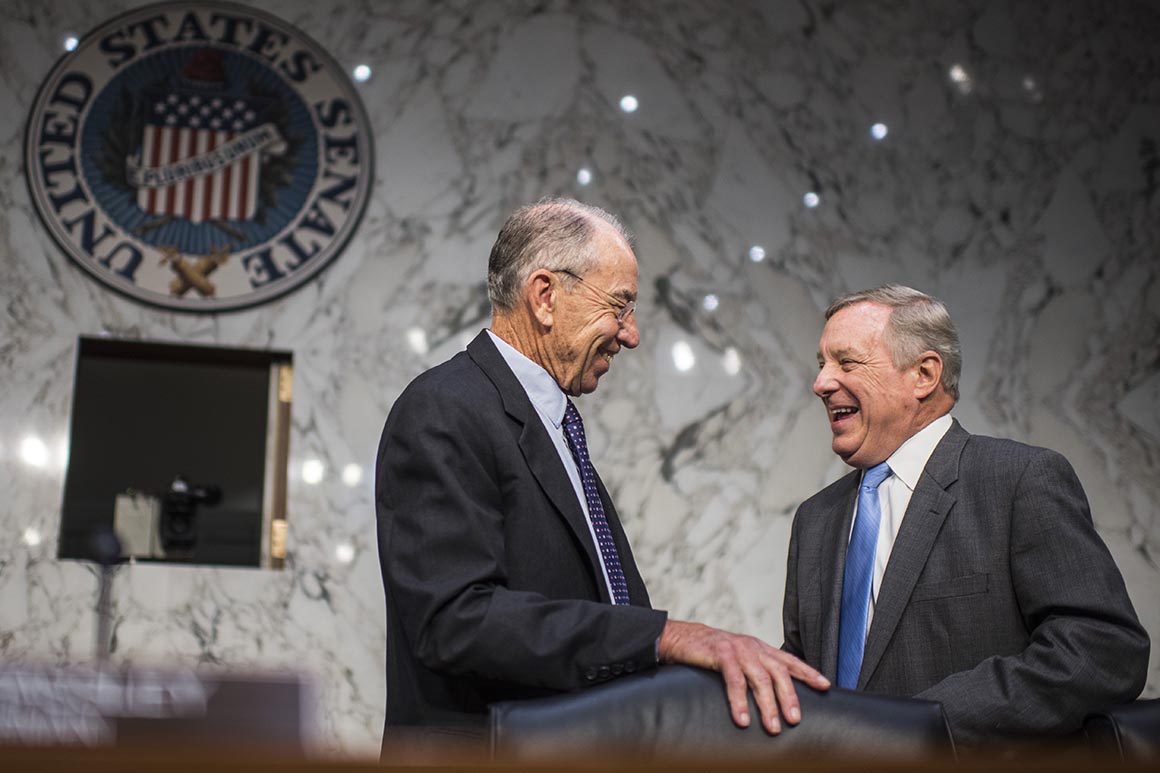"Free PACER" Bill Advances Through Senate Judiciary Unanimously
The Senate Judiciary Committee today by voice vote advanced the Open Courts Act (S. 2614), a bill that would modernize the federal judiciary’s case management system and — finally — make access to court filings free for all Americans.
The bill was initially slated for discussion in committee last week, yet Chairman Durbin opted to postpone it for a week to allow for a handful of changes. Though advocates are cheering some and are not so keen on others, none of the amendments substantially alters the bill’s impact or implementation, so strong support of the bill from Fix the Court, and, we believe, other leading nonprofit legal groups, remains.
“There’s no reason the American public should pay for public documents. The current cost to view or download a filing, ten cents per page, might not seem like a lot, but it quickly adds up and has been a barrier to access to justice for too long,” FTC’s Gabe Roth said. “The Open Courts Act fixes that, makes PACER free and modernizes the entire case management and filing system in a way that can make the judiciary’s software a crown jewel and not an embarrassment.”
Summary of the amendments:
Aug. 4 introduced bill here; Dec. 8 amendments (voted on this morning) here
 The bill, introduced by Sens. Portman and Wyden this summer but now with a dozen cosponsors, including Sens. Grassley and Durbin (right), now includes a requirement that PACER users, the first time they visit the new PACER site once documents have been made free (within three years), to click a box saying that they “will not use the system for an unlawful purpose.”
The bill, introduced by Sens. Portman and Wyden this summer but now with a dozen cosponsors, including Sens. Grassley and Durbin (right), now includes a requirement that PACER users, the first time they visit the new PACER site once documents have been made free (within three years), to click a box saying that they “will not use the system for an unlawful purpose.”
This is akin to the box visitors to the Senate’s financial disclosures and periodic transaction reports site must check before viewing those documents.
On the other hand, the bill now says that public access must occur “without requiring [any more onerous] registration.” (See advocates’ Dec. 6 letter on registration here.)
The pay-for in the updated OCA is also a bit different. In addition to the Administrative Office of the U.S. Courts being able to collect fees from “power users” and federal agencies for their use of the case management system, the bill now authorizes appropriations for the AO to carry out its mandate. The AO is required in the text to submit a report to House and Senate Judiciary within 90 days of enactment.
Potential filing fee increases remain, yet the text has been clarified to ensure that any increases after are only incurred “to the extent necessary to cover such costs not otherwise provided by appropriations,” are “graduated” and take into account “the status of the filer in the action and the financial hardship an additional fee would place on the filer.” FTC does not anticipate the need for filing fees to be increased at all.
Finally, the new text includes a “cybersecurity review,” whereby the AO would work with cybersecurity agencies in the executive branch to ensure high standards.
Among these fairly milquetoast changes, a concerning one might be the AO’s report to Congress on the appropriations “needed” to carry out the bill’s mandates. The AO had last year used a talking point in lobbying against the bill saying it’d cost $2 billion to update CM/ECF and make PACER free, which was erroneous, laughable and based on a decade-old, failed California Courts experiment to digitize its case filings.
The CBO’s cost Dec. 2020 estimate to build the new system was in the mid-two-digit millions, though given the fees that the AO is collecting from power users and agencies, the appropriation would more likely need to be in the single-digit millions, at most.
The AO has also bristled at the three-year timeline to complete the project, as recently as this week requesting a nine-year timeline. Of course the bill does not require “old PACER” to be replaced with “new PACER” all at once — it requires iterative updates to the system rolled out every few months, so users’ experience will constantly be improving ad infinitum. The AO recently acknowledged that’s how to do it. The three-year timeline exists to ensure there is a guaranteed date not far into the future by which all filings are free for the public to view and download. Periodic updates to CM/ECF and PACER, like any software system, will continue so long as that software is extant.
Summary of the bill:
The Open Courts Act would require the Administrative Office of the U.S. Courts, working in coordination with the GSA, to develop and implement within three years a unified, modernized software system to manage the online case filings and dockets of the federal courts. It would require that all court records — currently available via the decades-old PACER.gov website and costing $0.10 per page to read or download — be accessible to the public for free within three years and that the records are machine-readable and searchable across the entire system. It would authorize the AO to ask for new appropriations; impose certain fees to federal agencies and high-volume, for-profit users; and/or raise filing fees should additional funding to cover the costs of developing the new system be deemed necessary. The measure also calls for improved system-wide security and requires that updates to it are rolled out every few months, as opposed to a wholesale replacement taking years.